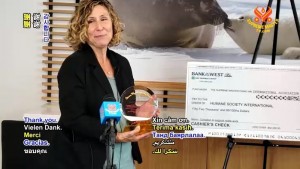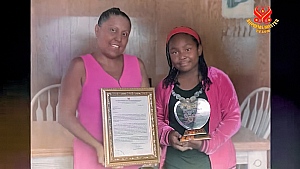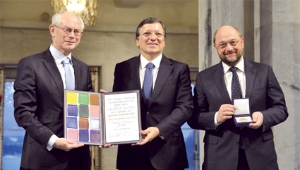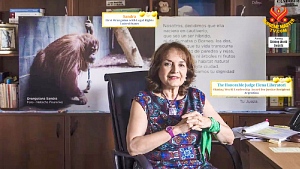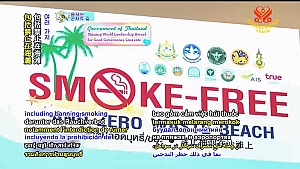
Dr. Robert Swan Lawrence: Outstanding Representative for Vegetarianism on a National Level
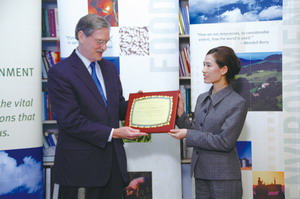 |
On May 8, Golden Year 3 (2006), fellow practitioners representing the Supreme Master Ching Hai International Association came to the capital city of Baltimore, Maryland, to present the Shining World Leadership Award to Dr. Robert Lawrence from the Johns Hopkins Bloomberg School of Public Health.
Dr. Lawrence is Associate Dean for Professional Practice and Programs, as well as Professor of Health-Policy and Management and Professor of Environmental Health-Sciences at the Johns Hopkins Bloomberg School of Public Health. He currently serves as a consultant to the Task Force on Community Preventive Services at the Centers for Disease Control of the U.S. Public Health Service. Dr. Lawrence is also a member of Physicians for Human Rights, which was a co-recipient of the 1997 Nobel Peace Prize. On behalf of Physicians for Human Rights and other human rights groups, Dr. Lawrence has participated in investigations of human rights violations in Chile, Czechoslovakia, Egypt, El Salvador, Guatemala, Kosovo, the Philippines and South Africa.
In 1996, Dr. Lawrence became the founding Director of the Center for a Livable Future at the School of Public Health, an inter-disciplinary group of faculty and staff that focuses on equity, health, and resources of the Earth. He is also an advisor for "Meatless Monday," a national public health campaign to help prevent heart disease, stroke, certain cancers and diabetes - four of the leading causes of death in America.
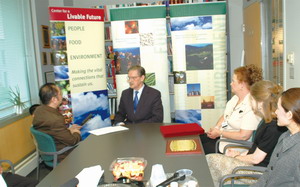 |
Meatless Monday is a non-profit organization working in association with the Johns Hopkins Bloomberg School of Public Health and with the support of 28 other Public Health schools. The campaign has also partnered with selected companies within the food industry to provide healthy, meatless alternatives in a wide variety of settings, including campus dining halls, worksite cafeterias, restaurants and grocery stores.
In appreciation of his heroic efforts to promote a healthy and compassionate way of life, and his outstanding work and enlightened leadership in creating a bright future for the world and for all humanity, fellow practitioners on behalf of the Supreme Master Ching Hai International Association presented Dr. Lawrence with the Shining World Leadership Award.
Accepting the award, Dr. Lawrence said, "I am very pleased to receive this award, and applaud you on the work that you are doing to try to achieve food security and a healthier approach to living sustainably in this world."
After the award ceremony, we had a chance to speak with Dr. Lawrence. Asked about the Meatless Monday campaign, he said that by avoiding meat and animal products even one day per week, saturated fat in the American diet would be reduced by 15%, thereby achieving the goal of the Surgeon General's Healthy People 2010 Initiative. At present, Americans consume too much high-density fat and sugar and too many highly processed foods. Dr. Lawrence explained that these things account in part for the epidemic of obesity that we are experiencing in America, resulting in Type 2 diabetes and other preventable diseases. Dr. Lawrence also noted that in the USA, the average male consumes twice the US Department of Agriculture recommended daily allowance for meat, and the average female consumes 170% of the recommended daily allowance.
Asked about the importance of animal protein, Dr. Lawrence said that with proper selection of legumes and vegetable protein, it is perfectly possible to get adequate protein that contains a balance of all the essential amino acids, without the intake of any animal products. At present, the high rate of meat consumption in high-income countries is unsustainable for the planet. If everyone in the world ate the kind of diet currently consumed in the United States, we would have only enough food for 2.7 billion people, while the world's population is 6.5 billion.
The animal protein is not only unhealthy since it's laden with saturated fat, it also takes about seven tons (6,350 kg) of grain to produce one ton (907 kg) of beef, about four tons (3,628 kg) of grain in exchange for one ton of pork and more than two tons (1,814 kg) of grain to produce one ton of poultry. It also takes 1,000 tons (9,070 kg) of water to produce one ton of grain. As a result, to produce one ton of beef, we need 7,000 tons (6,350,000 kg) of water, the Earth's most precious resource. This is not sustainable from a global food security perspective.
Asked about the future, Dr. Lawrence said unless we utilize our cereal and grain crop as a more important part of the human diet, we simply will not be able to solve the problem of hunger. One billion people are malnourished throughout the world, and the number could increase tremendously if we don't do something about the current agriculture system.
However, Dr. Lawrence also added that even though his mind is pessimistic about the hard data, his heart is still optimistic about the future of our planet. The human species has shown itself to be very adaptable. We have learned from our mistakes and have managed to come together during crisis times. But, he said, we had better begin doing it quickly to create a future for our children, grandchildren, and great grandchildren.
Concluding the interview, Dr. Lawrence sent his regards to the Supreme Master Ching Hai, saying, "I am delighted to learn that there are other groups working on improving nutrition, on sharing resources of the Earth equitably and responding to crises like the earthquake in Pakistan. I hope that You and Your organization will continue to assist in this humanitarian manner throughout the world."
